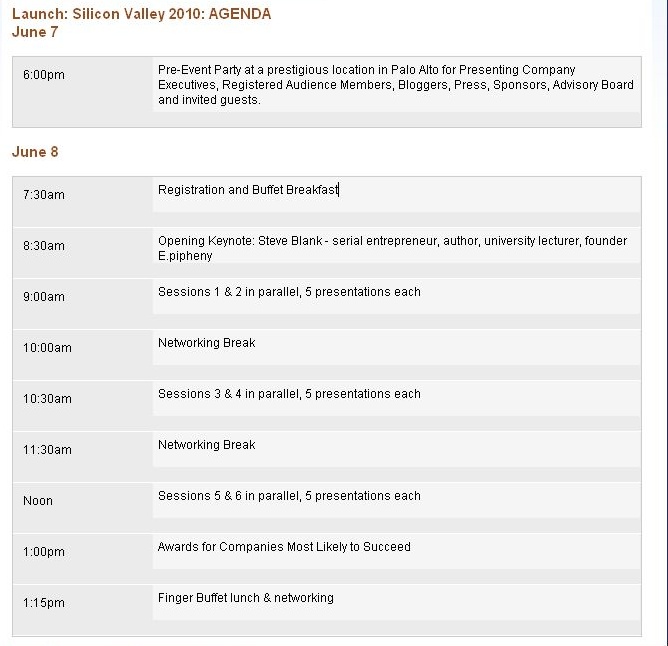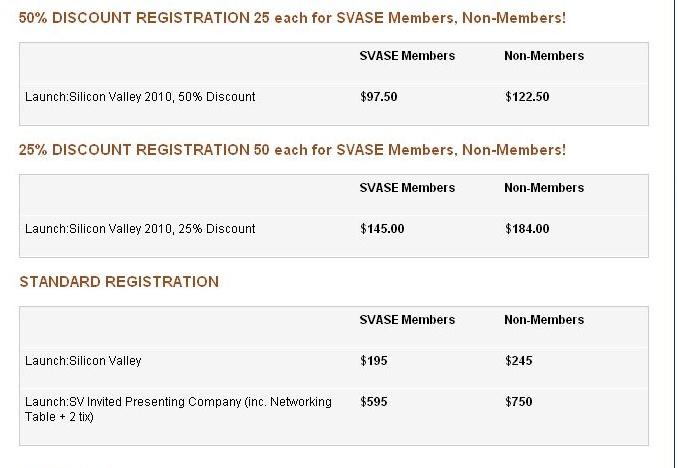Difference between revisions of "Directory:Launch: Silicon Valley"
Sean.davis (talk | contribs) |
Sean.davis (talk | contribs) |
||
| Line 1: | Line 1: | ||
| − | [[Image: | + | [[Image:LSV_1.jpg]] |
| − | + | [[Image:LSV_2.jpg]] | |
| + | '''LOCATION :''' | ||
| − | + | '''Microsoft Building 1, 1065 La Avenida St, Mountain View, CA 94043''' | |
| − | + | '''Steve Blank Biography''' | |
| − | + | On his blog site, Steve reckons that put to a vote he might have been chosen “least likely to succeed” in his New York City high school class. His path has taken him from repairing fighter planes during the Vietnam War in Thailand, to spook stuff in undisclosed location(s), and he was lucky enough to arrive at the beginning of the boom times of Silicon Valley in 1978. | |
| − | + | After 21 years in 8 high technology companies Steve retired in 1999. His last company, E.piphany, started in his living room in 1996. Steve’s other startups include two semiconductor companies (Zilog and MIPS Computers), a workstation company (Convergent Technologies), a consulting stint for a graphics hardware/software spinout (Pixar), a supercomputer firm (Ardent), a computer peripheral supplier (SuperMac), a military intelligence systems supplier (ESL) and a video game company (Rocket Science Games). | |
| − | + | Total score: two large craters (Rocket Science and Ardent), one dot.com bubble home run (E.piphany) and several base hits. | |
| − | + | After he retired, Steve took some time to reflect on his experience and wrote a book about building early stage companies: Four Steps to the Epiphany. He moved from being an entrepreneur to teaching entrepreneurship to both undergraduate and graduate students at U.C. Berkeley, Stanford University and the Columbia University/Berkeley Joint Executive MBA program. The “Customer Development” model that Steve developed in his book is one of the core themes for these classes. In 2009 Steve was awarded the Stanford University Undergraduate Teaching Award in the department of Management Science and Engineering. The same year the San Jose Mercury News listed him as one of the 10 Influencers in Silicon Valley. | |
| − | + | In 2007 Governor Arnold Schwarzenegger appointed Steve to serve on the California Coastal Commission, the public body which regulates land use and public access on the California coast. | |
| − | + | Steve serves on the board of Audubon California (and its past chair) and spent several years on the Audubon National Board. He’s also a board member of Peninsula Open Space land Trust (POST). In 2009 he became a trustee of U.C. Santa Cruz and joined the board of the California League of Conservation Voters (CLCV). | |
| − | |||
| − | |||
| − | |||
| − | |||
| − | |||
| − | |||
| − | |||
| − | |||
| − | |||
| − | |||
| − | |||
Revision as of 07:14, 1 March 2010
LOCATION :
Microsoft Building 1, 1065 La Avenida St, Mountain View, CA 94043
Steve Blank Biography
On his blog site, Steve reckons that put to a vote he might have been chosen “least likely to succeed” in his New York City high school class. His path has taken him from repairing fighter planes during the Vietnam War in Thailand, to spook stuff in undisclosed location(s), and he was lucky enough to arrive at the beginning of the boom times of Silicon Valley in 1978. After 21 years in 8 high technology companies Steve retired in 1999. His last company, E.piphany, started in his living room in 1996. Steve’s other startups include two semiconductor companies (Zilog and MIPS Computers), a workstation company (Convergent Technologies), a consulting stint for a graphics hardware/software spinout (Pixar), a supercomputer firm (Ardent), a computer peripheral supplier (SuperMac), a military intelligence systems supplier (ESL) and a video game company (Rocket Science Games). Total score: two large craters (Rocket Science and Ardent), one dot.com bubble home run (E.piphany) and several base hits. After he retired, Steve took some time to reflect on his experience and wrote a book about building early stage companies: Four Steps to the Epiphany. He moved from being an entrepreneur to teaching entrepreneurship to both undergraduate and graduate students at U.C. Berkeley, Stanford University and the Columbia University/Berkeley Joint Executive MBA program. The “Customer Development” model that Steve developed in his book is one of the core themes for these classes. In 2009 Steve was awarded the Stanford University Undergraduate Teaching Award in the department of Management Science and Engineering. The same year the San Jose Mercury News listed him as one of the 10 Influencers in Silicon Valley. In 2007 Governor Arnold Schwarzenegger appointed Steve to serve on the California Coastal Commission, the public body which regulates land use and public access on the California coast. Steve serves on the board of Audubon California (and its past chair) and spent several years on the Audubon National Board. He’s also a board member of Peninsula Open Space land Trust (POST). In 2009 he became a trustee of U.C. Santa Cruz and joined the board of the California League of Conservation Voters (CLCV).

